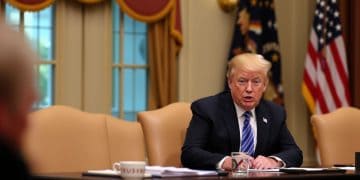Amid a sharp decline in U.S. stock markets, President Donald Trump acknowledged the difficulties associated with his administration’s tariff policy. Following a clarification from the White House that tariffs on Chinese goods would remain at least 145 percent, and an earlier announcement of a 90-day pause on tariffs for over 75 countries, Trump addressed the challenges during a cabinet meeting on Thursday.
The president recognized the “transition problems” inherent in his trade policies but expressed pride in the market’s significant gains on Wednesday, calling it “the biggest day in history” for markets. He acknowledged that ongoing trade negotiations were progressing well, although time constraints were a challenge. Trump also noted that many countries were eager to make deals, and he remained confident in the positive outcome of these discussions.
Trump highlighted economic indicators, including a drop in consumer prices, low inflation, and reductions in energy costs and interest rates. He emphasized the strength of relationships with his team and the positive impact of the trade meetings, noting that the administration was making significant progress.
Despite the positive remarks, analysts and investors raised concerns about the unpredictable and inconsistent nature of Trump’s trade policies. They warned that this unpredictability could dampen investment and potentially slow global economic growth, especially considering the long-term effects of the tariffs already in place.
China, still subject to the 145 percent tariffs, has expressed openness to continuing negotiations with the United States.
The U.S. stock market experienced a volatile day after a nearly 3,000-point rise the previous day. The Dow Jones Industrial Average fell by 1,015 points, or 2.5 percent, while the S&P 500 dropped 3.46 percent and the Nasdaq Composite fell 4.31 percent. While the recent pause on most tariffs provided temporary relief, experts caution that the damage from existing tariffs will not be easily reversed and the economy may take time to recover.
Commerce Secretary Howard Lutnick provided an update on the tariff negotiations, noting that many countries had presented offers they likely wouldn’t have made without the pressure of the administration’s actions.
U.S. Treasury Secretary Scott Bessent spoke on the market situation, highlighting the upcoming increase in the debt ceiling and a positive inflation report. He also pointed out that energy prices had dropped more than 20 percent since January 20.
Trump reiterated his goal of using tariff revenue to address the national debt, reduce taxes, create jobs, and enhance border security.
Get comprehensive supply chain report news updates at The Supply Chain Report. For international trade tools, see ADAMftd.com.
#TrumpTariffs #TariffPolicy #USMarkets #TradeNegotiations #GlobalTrade #StockMarketVolatility #ChinaTariffs #EconomicImpact #MarketReactions #USTradePolicy















